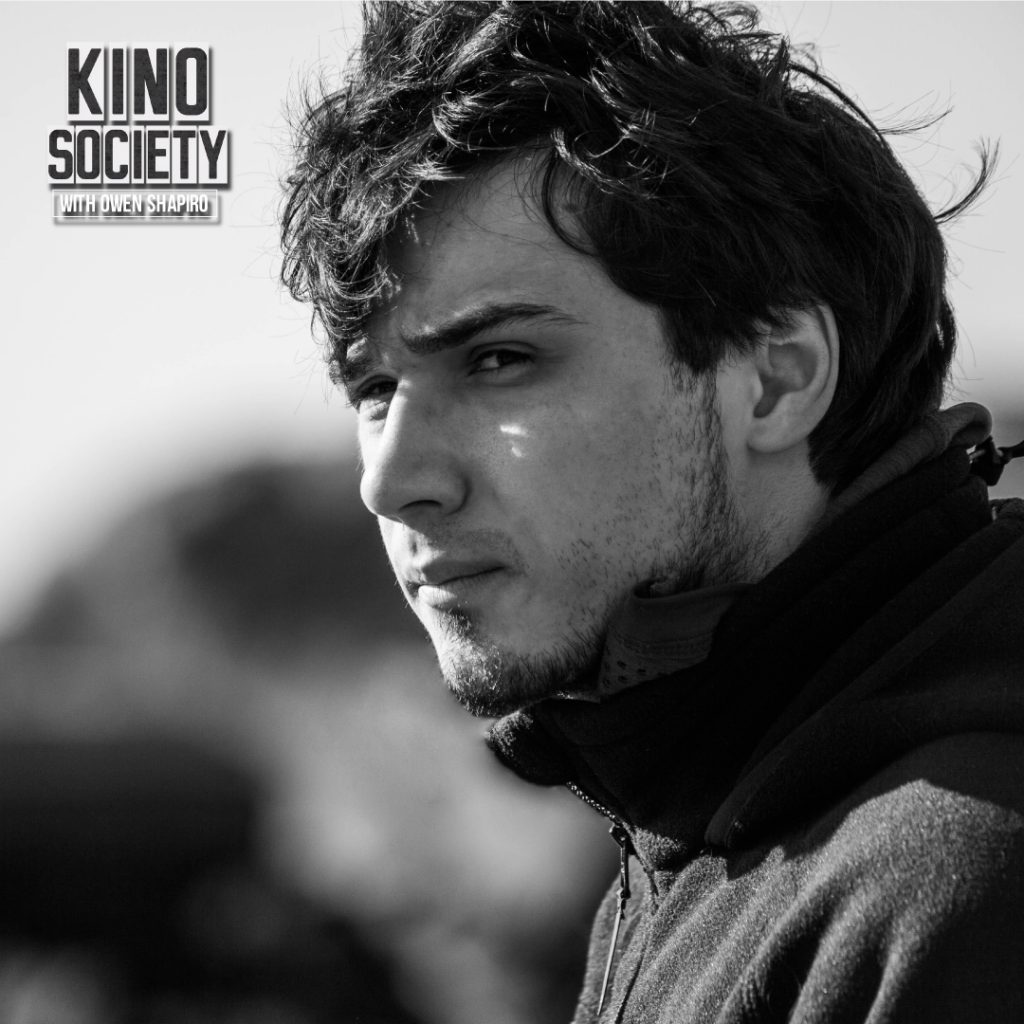Through the Lens with Sebastian Thaler
Sebastian Thaler 00:00
Hi! Thank you for having me!
Owen Shapiro 00:00
What made you wanna get a career in the film industry? Welcome to Kino Society with Owen Shapiro. In today’s episode we have Austrian cinematographer, Sebastian Thaler. He shoots with a lucid immediacy that makes him a talent to watch. Thaler is next set to commence production on director Juri Rechinsky’s latest arthouse feature, Utopia, in fall 2021. Welcome to Kino Society.
Sebastian Thaler 01:17
That’s a difficult question because I grew up with my parents, which are both filmmakers like my father, who’s also cinematographer and my mother, which was working in the production. And I was growing up with film puppets in our family and dinner tables. So I just grew up with it. But I can’t say if I was actively deciding to be also cinematographer, it just happened.
Owen Shapiro 01:49
So was cinematographer the thing that you thought you want to do? As soon as you want it? You knew you want to get job and film industry?
Sebastian Thaler 01:59
Yeah, because when I was listening to music when I was young, in my teenage, let’s say ages, I saw always images when I was into music, and I thought maybe it would be nice to try to recreate the images in story that I see. So that got my attention to that. So I started to make pictures, photography, and then I got to the Film Academy in Vienna.
Owen Shapiro 02:31
So you’re mostly based in Europe? So is there any big differences between how filmmaking or just production general occurs in Europe in comparison to other countries?
Sebastian Thaler 02:49
I think it’s, of course, it’s different because Europe has a different tradition of making movies. But we also have to deal with lower budgets. So we always try to solve problems in a different way to get the same result. So it’s, I would say, that’s the kind of difference.
Owen Shapiro 03:14
Do you think that having lower budgets usually makes you get more creative?
Sebastian Thaler 03:20
Can be because you have to, you have to when you when you face a problem or an issue, you have to come up with an idea which maybe you never thought before, because he could have, I don’t know, a second grade or whatever. And if you can get it you tried to find a different kind of solution? And sometimes or more often, it’s the better one.
Owen Shapiro 03:46
Would you prefer working on films that have higher budgets or lower budgets that force you to work your mind?
Sebastian Thaler 03:53
I would say it depends on the story, what the story needs. Sometimes, of course, you need the technical background to produce that story to create that story. And to create the images, three depends on the on the on the story in the script.
Owen Shapiro 04:10
So what kind of talent and Jen also that what kind of talent does your job require?
Sebastian Thaler 04:17
I think, to be a cinematographer, first of all, you have really to have good empathy to other people like to understand their state of feeling at the moment, especially in documentaries, where you have to find out if you can cross a certain border or if you have to step back at that moment when you feel the scene. So I think that’s one thing that you have to have to have. The other one is like of course, to be a good observer and It’s not It’s not about the technical stuff because this you can all learn. But I think the most important stuff is really to, to observe and observe people and try to get into their, let’s say into the inner circle where you can understand if they feel comfortable with you being that close when you’re close with the camera to them or not. I guess that’s like, very important.
Owen Shapiro 06:23
So do you have any preferences in the kinds of films you’d like to work on?
Sebastian Thaler 06:29
Preferences? It really depends on the story. I really like stories, which are very close to their psychologically psychological problems that some people face. So I really like character driven movies.
Owen Shapiro 06:53
Do you think like interaction with the director really helps cinematography? Or are you more of a lone, you prefer to have lone creativity on that?
Sebastian Thaler 07:08
It depends on the director, of course. But sometimes it’s nice to get freedom. When you create images, sometimes it’s very important to work with the director and to get to understand his vision, because of course, everybody has his own vision. But for example, on 7500, I had almost free let’s say, I could move freely and create the images free. How I liked them.
Owen Shapiro 07:46
Which of your works are you most proud of? You already mentioned that you mostly lean towards psychological affair? So if those Maybe.
Sebastian Thaler 07:58
I really like a real like, Everything Will Be Okay. It’s a short movie. Because it’s a small story between the father and his daughter. And the other movie, what they’re really like, of course, is also falling, which has to do with It’s a story of coming of age story between a young laugh and girl which doesn’t know which direction she wants to go in her life. And there’s also 7500 which which were we exploring the deeper conflicts of, of people when they have let’s say when they get rules from outside, but the inner feelings are disrupting them to do to follow the rules that they were giving.
Owen Shapiro 08:53
What do you think draws you towards those kinds of movies particularly because they’re not really what people think of when they hear profound cinematography.
Sebastian Thaler 09:07
I think it’s my interest in people how they think how they react on certain problems, or how they would solve a certain problem in their life because of course, we are all people which are searching for the sense of life. And if you if you work on projects with me make you richer in that that particular topic that can expand your let’s say, knowledge about life, or let’s say just like to get a small feeling, what life could be on what life could mean that I think it’s something what really attracts me and interest.
Owen Shapiro 09:50
Which of your works is most challenging to pull off.
Sebastian Thaler 09:57
I think the most challenging until now was 7500.
Owen Shapiro 10:02
What kind of film is 7500.
Sebastian Thaler 10:05
7500 is a, let’s say, it’s a feature film, but it’s made like documentary. And we were, we were trying to recreate a feeling like the director was telling me, I wanted the audience feels that the cameraman was stuck in the carpet. So that was, that was the first sentence when I got the script from him. And what we tried there is we tried long scenes without any interrupting by by the director or by marks or by whatever. So we had seen over filming certain scenes, which were almost 15 minutes long. So that was quite challenging to foresee the movements of the actors to provide everything what where they could go, how would they act there. So that was quite challenging to recreate that. That realistic environment of the carpet, especially for the for the for feature film.
Owen Shapiro 11:19
You think it’s harder to do to work with more manmade films or films that have a lot more manmade objects in them or take place in urban locations, then more natural environments.
Sebastian Thaler 11:35
It really depends on the story, it can be easy to shoot something with, with one character in the desert. And it can be the same time more challenging to shoot. I don’t know. scene with two people sitting up front in a cafe. So it really depends on the story and what the director’s vision is.
Owen Shapiro 12:00
Do you have any few more questions about you now? Just you personally, do you have any favorites movies or cinematographer?
Sebastian Thaler 12:12
Some of my favorite movies are like from Tarkovsky. I really like for example his movies because they’re very slowly they’re very slowly trying to get you to the characters. And the of course we would never do this movies right now like he did. But it’s very interesting to watch how he were directing the actors to move where exactly the marks they had to hit. How he created in one image, triangles triangles with people so that was that’s very very interesting for me how how they were doing the movies in the past times. It it’s for sure, movies to the hard to watch now because we’re always used very fast edits and cuts. And, but it’s really nice to slow down and really get into it to the movies. Of course, I like other movies, too, but my favorite cinematographer is I think it’s Kaminsky. He was smooth baking all Spielberg movies. And what I like his style of lighting, like every really every frame that he creates, or he lights it’s really like a painting really precisely lights every frame and corner of his office composition.
Owen Shapiro 14:07
Tarkovski is definitely really great. His films are kind of perfect slowburn Yeah. Especially Stalker here that one stop we my favorite of his. So what would you say to someone who wants to enter the world of cinema?
Sebastian Thaler 14:29
The question is, cinematographygeneral world of cinema. I think the most important thing is the story. And it can be filmed with anything with the iPhone or whatever if the story is catching you and this making the people reflect on what they See? I think that’s the main goal to start with the all the technical stuff all this red, Alexa’s whatever it’s not. Not important, really important is the story and catch caption to get the audience to reflect on what this what they see.
Owen Shapiro 15:20
So, as I mentioned before, is your new film that you’ve worked on Utopia is coming on fall? Can you tell us a bit more about that?
Sebastian Thaler 15:33
Not much yet, because it’s bit the script, which is locked up, but it will have a certain kind of approach to that to the filming style, we will try to really improvise and control the scene during the night shifts. And to really stick to the characters and try not to, let’s say, leave any seconds without filming them. So that will be our main, let’s say approach how we will work on that movie, but I can say anything more.
Owen Shapiro 16:20
You have any other current projects.
Sebastian Thaler 16:24
At the moment I’m filming and small Austrian TV series drama. It’s about four women which are trying to solve a murder of one child.
Owen Shapiro 16:42
And last but not least, how can my listeners find and connect with you?
Sebastian Thaler 16:48
I have an Instagram account. I’m on Facebook. And of course over my website. People can write me and ask if they want.
Owen Shapiro 16:58
Thank you so much for being here today. Sebastian, thank you very much for that ad. And that’s everything. Don’t forget, you can subscribe to jr society on iTunes and Spotify. That’s all for today. Don’t forget, you can subscribe to Kino Society on iTunes and Spotify.




